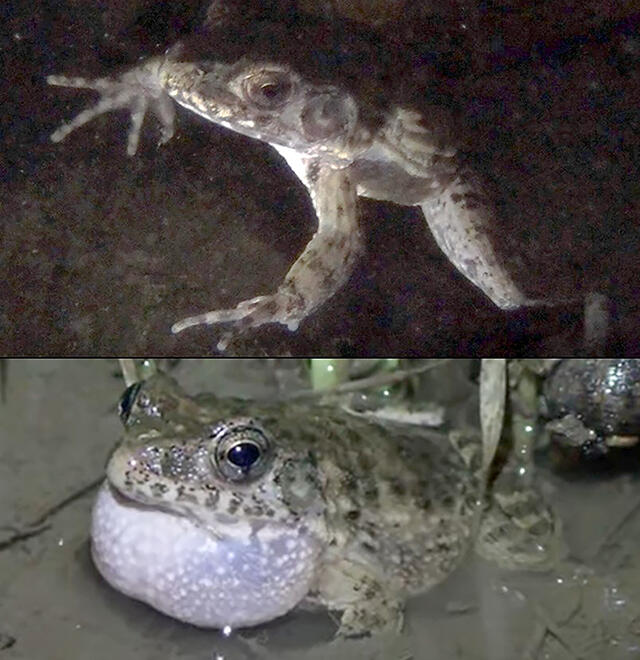Associate Professor Yuichi Kano of the Institute of Decision Science for a Sustainable Society at Kyushu University, discovered for the first time that the Japanese wrinkled frog (ibogaeru) vocalizes not only on land but also in water. While conducting an underwater survey on fish in a tributary of the Mogami River system in Yamagata Prefecture, he noticed that the Japanese wrinkled frog was singing in the water, and he succeeded in recording the phenomenon in a video. This finding was published online in the domestic magazine "Wetland Research".

Below: Ordinary croaking using vocal sac.
From this study, it was found that the behavior of vocalizing exhibited by the Japanese wrinkled frog in water is different from that on land. Furthermore, the vocalizations were found to be produced only via contractions in the abdomen, without the inflation of the vocal sac. In addition, when these vocalizations were analyzed, the interval between croaks was shorter than that on land, and the pitch was relatively low. However, it is not known why the Japanese wrinkled frog vocalizes in water.
There are various possible explanations for this phenomenon. For instance, vocalizing underwater may help them avoid predation by terrestrial organisms (such as birds), or females may prefer males that can vocalize underwater. It is also unclear whether other frogs, such as the Asian grass frog and the black-spotted pond frog, which are normally thought to croak on land, croak in water as well. This aspect must be investigated in the future.
Associate Professor Kano said, "Wrinkled frogs, also called ibogaeru, seem to not be widely liked. However, this time, I found out that they exhibit an interesting behavior of underwater vocalization. We hope that you will take this opportunity to become interested in frogs and other amphibians. Also, the wonders of wildlife and their discoveries are indeed all around us. Anyone, even non-researchers, can make new discoveries by carefully observing nature."
This article has been translated by JST with permission from The Science News Ltd.(https://sci-news.co.jp/). Unauthorized reproduction of the article and photographs is prohibited.




